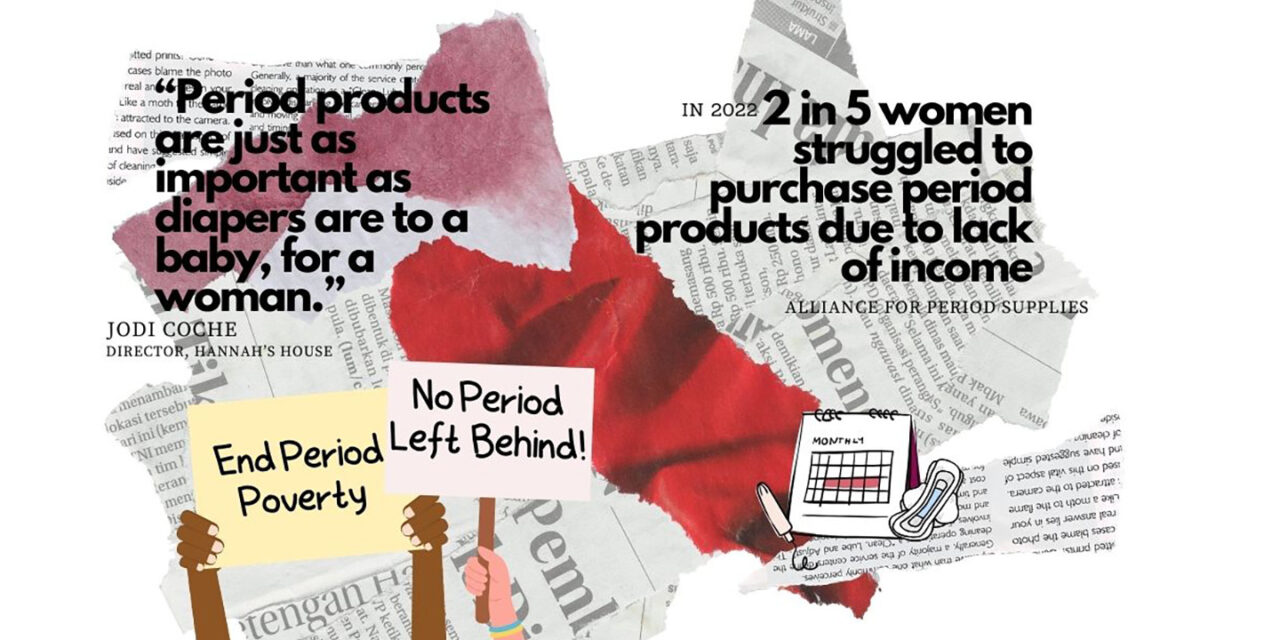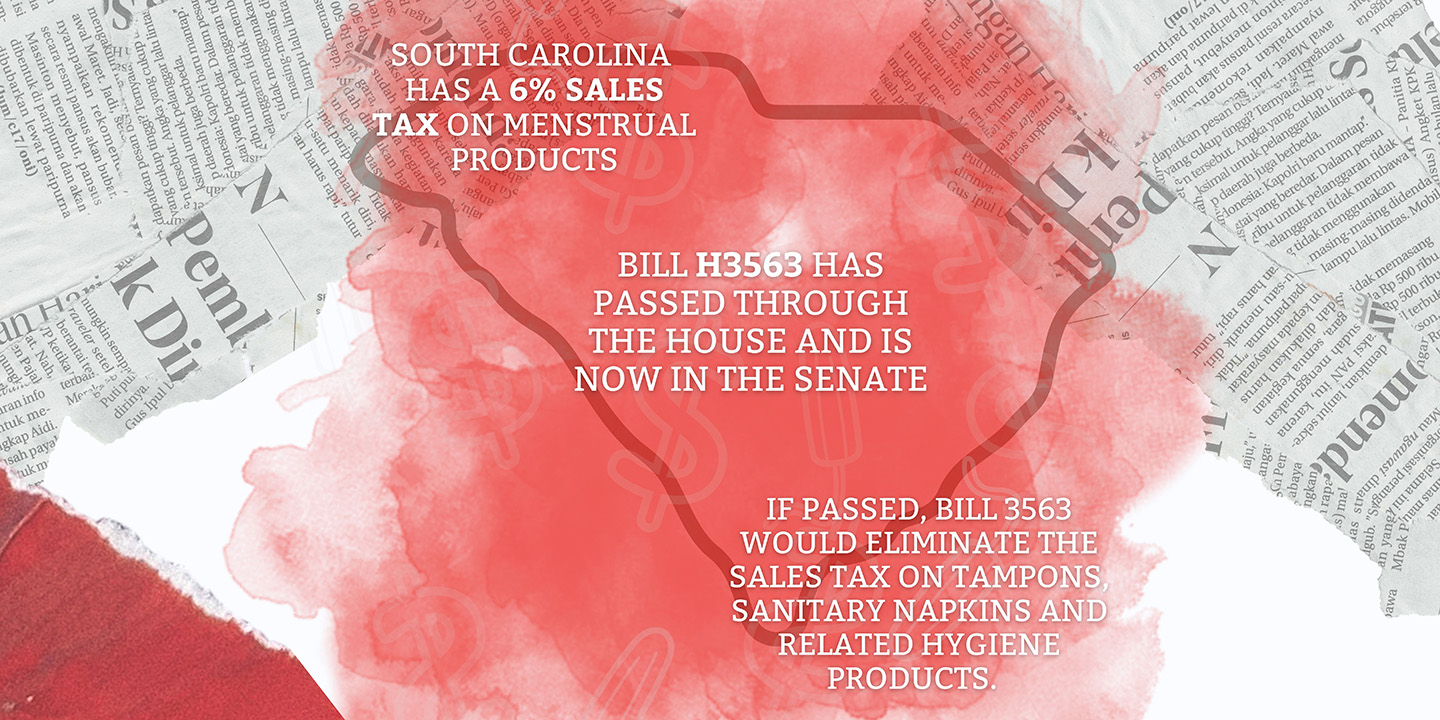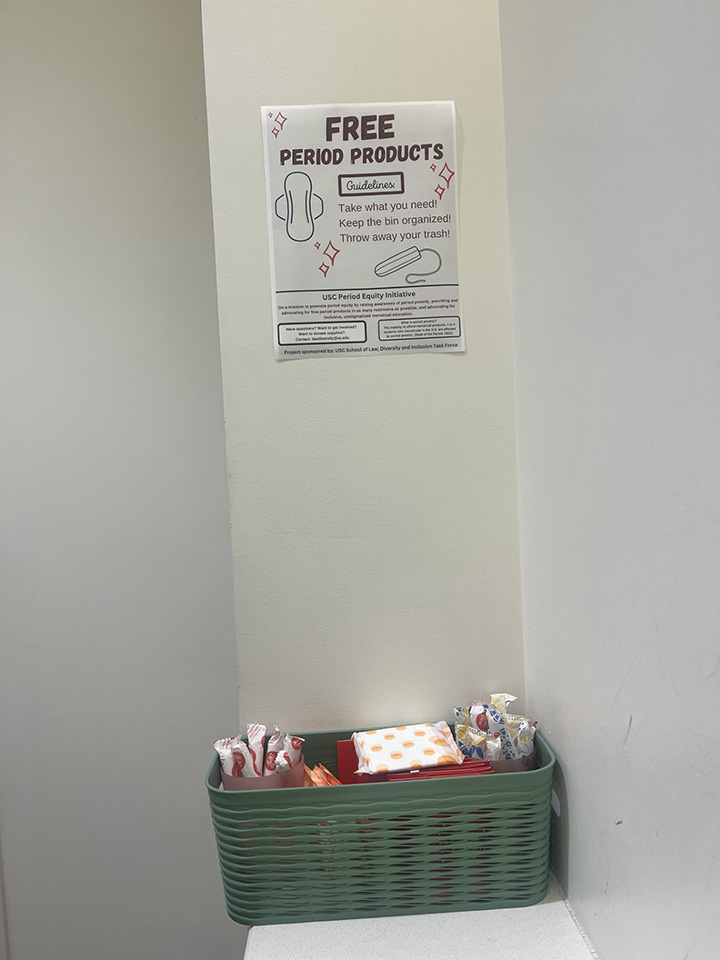(Photo illustration by Madeline Hager/Carolina News & Reporter )
Menstrual products are expensive and a monthly necessity for women and girls, but what happens when you can’t afford them?
No Period Left Behind, the University of South Carolina’s first club dedicated to menstrual health, has stepped up to help students and others struggling with poverty afford period products.
“This is a problem that not a lot of people know about,” Treasurer Jiya Desai said.
Desai said before becoming a member of the organization, she didn’t realize just how challenging it could be for some women to get menstrual products, especially in rural areas.
“It was a 30-minute drive just to access those period products,” Desai said. “And then they’re expensive.”
Anusha Ghosh, the organization’s vice president, said many women in rural areas are told to use toilet paper and are not educated on the right supplies to use.
According to the national Alliance for Period Supplies, 1 in 5 women and girls in South Carolina are living below the poverty line and don’t have good access to period supplies.
“It can inhibit such a big part of your education,” Desai said. “We don’t realize it because we readily have access to it.”
No Period Left Behind plans to distribute more than 3,000 menstrual products to Saluda Midlands High School this month, Ghosh said.
“That would also be very impactful because, you know, in a lot of these areas, there isn’t that much support for educating about what a period is, how to use a period product,” Ghosh said.
Other organizations at USC are working to make sure what activists call “period equity” isn’t an issue.
The Community and Engagement Task Force is a group that aims to take down any barriers to students’ academic success at the USC Joseph F. Rice School of Law.
This task force started a period initiative last year to provide free menstrual products in law school bathrooms.
David Mahatha, director of inclusive excellence at the law school, oversees the task force.
“They are definitely appreciating it,” Mahatha said of the free supplies.
The menstrual products are so popular that the task force ran out of supplies in September. Members are asking faculty and staff for donations until they can refill supplies but will get more once the budget is replenished in January, Mahatha said.
Mahatha said the Black Law Student Administration is also passionate about providing free menstrual supplies and has an initiative similar to No Period Left Behind.
“They are collecting for public schools and other institutions that probably don’t have the budget to provide,” he said.
Mahatha said he’s proud of students’ passion for the initiative.
“We have to make sure that we can provide the resources and supplies needed to make it more convenient for students so that they can leave the classroom, go to the restroom, handle their business, and then get back to class so that they can be academically successful,” he said.
Menstrual product availability leads to more academic success, said Dr. Katie Hirsch, a professor at the Arnold School of Public Health.
“If we don’t have good product availability and access, we start seeing high rates of girls not going to school,” Hirsch said.
Education is key, Hirsh said.
“If you’ve never been exposed to different period products and how to use them, it’s weird and scary,” Hirsch said. ”How much better would it be if they are just generally teaching us?”
Women’s cycles are more important than many think and a good indicator of health, Hirsch said.
“It’s very sensitive,” Hirsch said of the menstrual cycle. “It changes to a lot of stressors and things in life.”
Menstrual stress or misinformation can lead to girls not participating in sports and all sorts of health issues, Hirsch said.
“Even if we’re not doing a sport now, we don’t feel like exercising and (doing) just good daily activity, which we know has wide impacts on part of your metabolic health, mental health, weight status, brain health,” Hirsch said.
About 40% of U.S. women struggle to purchase period products because of income, and a quarter of teens have missed class because they don’t have access to the supplies, according to the Alliance for Period Supplies.
“Girls don’t go to school if they don’t have pads,” said Jodi Coche, director of Hannah’s House, a Columbia women’s homeless shelter. “… A lot of women can’t work because they have a period, and they have nothing to use.”
Coche, who found herself seeking shelter at Hannah’s House years ago, now works there. But she is struggling to give the women there now one of their most basic needs.
“We do have a closet that has some pads and tampons, but not nearly enough for the women,” Coche said.
On average, a pack of 36 tampons is about $8. And the same number of pads are about $10.
There’s a 6% sales tax on menstrual products in South Carolina. That’s despite exemptions that include food sold to nonprofits, hearing aids, computers and even the material needed to build missiles, according to the S.C. Department of Revenue.
Nationwide, 24 of 50 states do not tax menstrual products, according to the Alliance for Period Supplies.
A bill that would make feminine hygiene products sales tax-free awaits consideration in the S.C. Senate after recently passing the House.
“(Menstrual products are) just as important as diapers are to a baby for a woman,” Coche said.
(Photo illustration by Madeline Hager/Carolina News & Reporter)
Free period supplies in a restroom at the USC Joseph F. Rice School of Law (Photo by Madeline Hager/Carolina News & Reporter)
Free menstrual products and contraception aids at the USC student health center (Photo by Madeline Hager/Carolina News & Reporter)
(Photo illustration by Madeline Hager/Carolina News & Reporter)






